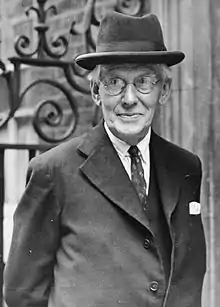The Lord Pethick-Lawrence | |
|---|---|
 Lord Pethick-Lawrence at 10 Downing Street | |
| Leader of the Opposition | |
| In office 21 January 1942 – February 1942 | |
| Monarch | George VI |
| Prime Minister | Winston Churchill |
| Preceded by | Hastings Lees-Smith |
| Succeeded by | Arthur Greenwood |
| Financial Secretary to the Treasury | |
| In office 11 June 1929 – 24 August 1931 | |
| Monarch | George V |
| Prime Minister | Ramsay MacDonald |
| Preceded by | Arthur Samuel |
| Succeeded by | Walter Elliot |
| Secretary of State for India and Burma | |
| In office 3 August 1945 – 1947 | |
| Monarch | George VI |
| Prime Minister | Clement Attlee |
| Preceded by | Leo Amery |
| Succeeded by | The Earl of Listowel |
| Personal details | |
| Born | Frederick William Lawrence 28 December 1871 London, England |
| Died | 10 September 1961 (aged 89) Hendon, London, England |
| Political party | Labour |
| Spouses | |
| Alma mater | Trinity College, Cambridge |
Frederick William Pethick-Lawrence, 1st Baron Pethick-Lawrence, PC (né Lawrence; 28 December 1871 – 10 September 1961) was a British Labour politician who, among other things, campaigned for women's suffrage.
Background and education
Born in London as Frederick William Lawrence, he was the son of wealthy Unitarians who were members of the Liberal Party. Three of his father's brothers, William, James, and Edwin, were politically active in various roles, including as Lord Mayor of London and as members of parliament. Frederick was educated at Wixenford,[1] Eton, and Trinity College, Cambridge,[2] where he was a member of Cambridge University Liberal Club.[3] He then became a barrister.
Political career

Lawrence met and fell in love with Emmeline Pethick, an active socialist and campaigner for women's votes. They finally married in 1901 after Lawrence converted to socialism. They kept separate bank accounts and they both took the surname 'Pethick Lawrence' (later Pethick-Lawrence).[4] He published various left-wing newspapers, including Votes for Women and became involved in the Labour Party. His involvement in the Women's Social and Political Union (WSPU), on behalf of women's rights, led to him serving a nine-month prison sentence in 1912, following Christabel Pankhurst's window-smashing campaign, even though he had disagreed with that form of action; because of his disagreement, indeed, he was expelled from the WSPU by Emmeline Pankhurst and Christabel. On account of his prison sentence he was expelled from the Reform Club.[5] Early in the First World War Pethick-Lawrence joined with others in founding the Union of Democratic Control (UDC), a leading anti-war organisation of which he became Treasurer. After acceptance by a Tribunal in Dorking in 1918, he worked on a farm in Sussex as a conscientious objector.
In 1923 Pethick-Lawrence was elected Member of Parliament (MP) for Leicester West, and was Financial Secretary to the Treasury from 1929 until the formation of the National Government in 1931; in the ensuing general election and the rout of the Labour Party he lost his seat. He was elected for Edinburgh East in 1935 and sworn of the Privy Council in 1937.[6] For a short period in January and February 1942 he acted as Leader of the Opposition to the coalition government. In 1945 Pethick-Lawrence was elevated to the peerage as Baron Pethick-Lawrence, of Peaslake in the County of Surrey.[7] From 1945 to 1947 he was Secretary of State for India and Burma, with a seat in the cabinet, and was involved in the negotiations that led to India's independence in 1947. Prime Minister Clement Attlee, however, made all the government's major decisions regarding India.[8]
Personal life
His first wife, Emmeline, Lady Pethick-Lawrence, died in 1954. Lord Pethwick-Lawrence later married Helen Craggs in 1957.[9] He died at Hendon, London, in September 1961, aged 89.
His older sister Annie Jane Lawrence (1863-1953) was responsible for building the open-air Arts and Crafts school The Cloisters in Letchworth Garden City.
Posthumous recognition
His name and picture (and those of 58 other women's suffrage supporters) are on the plinth of the statue of Millicent Fawcett in Parliament Square, London, unveiled in 2018.[10][11][12]
References
- ↑ Brian Harrison, 'Lawrence, Frederick William Pethick-, Baron Pethick-Lawrence (1871–1961)’, in Oxford Dictionary of National Biography, Oxford University Press, 2004; online biography at oxforddnb.com, January 2011, accessed 4 September 2013 (subscription required)
- ↑ "Lawrence [post Pethick-Lawrence], Frederick William (LWRN891FW)". A Cambridge Alumni Database. University of Cambridge.
- ↑ "About us « Keynes Society". Keynessociety.wordpress.com. 28 February 2009. Retrieved 27 January 2012.
- ↑ Brian Harrison, 'Lawrence, Emmeline Pethick-, Lady Pethick-Lawrence (1867–1954)', Oxford Dictionary of National Biography, Oxford University Press, Sept 2004; online edn, May 2006 accessed 17 Nov 2007
- ↑ Women, Clubs and Associations in Britain Doughan & Gordon, 2006, page 19
- ↑ "No. 34407". The London Gazette. 11 June 1937. p. 3731.
- ↑ "No. 37234". The London Gazette. 21 August 1945. p. 4227.
- ↑ Kenneth Harris, Attlee (1982) p 362.
- ↑ "Lawrence, Frederick William Pethick-, Baron Pethick-Lawrence". Oxford Dictionary of National Biography (online ed.). Oxford University Press. doi:10.1093/ref:odnb/35491. (Subscription or UK public library membership required.)
- ↑ "Historic statue of suffragist leader Millicent Fawcett unveiled in Parliament Square". Gov.uk. 24 April 2018. Retrieved 24 April 2018.
- ↑ Topping, Alexandra (24 April 2018). "First statue of a woman in Parliament Square unveiled". The Guardian. Retrieved 24 April 2018.
- ↑ "Millicent Fawcett statue unveiling: the women and men whose names will be on the plinth". iNews. 24 April 2018. Retrieved 25 April 2018.